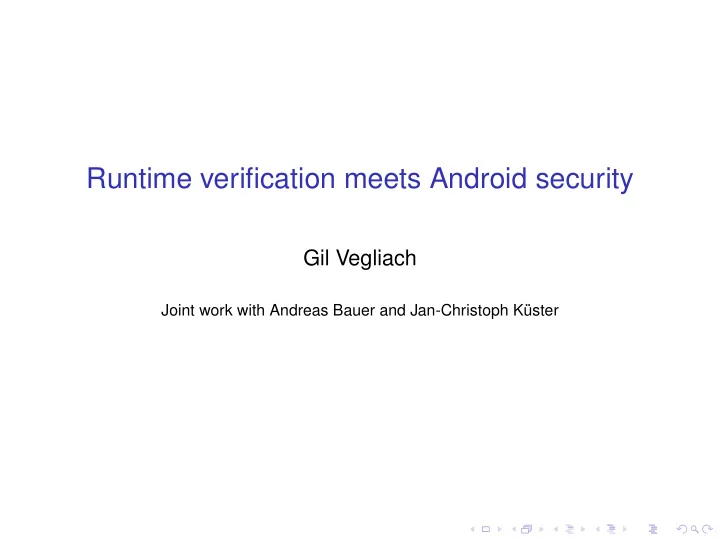

Runtime verification meets Android security Gil Vegliach Joint work with Andreas Bauer and Jan-Christoph K¨ uster
Background, what Android is ◮ Developed by Android Inc. (acquired by Google in 2005) ◮ Open Handset Alliance (founded in 2007) ◮ Software stack for mobile devices: OS, middleware, key applications
Android’s security model In a nutshell. . . System level protection: ◮ Apps are “sandboxed”: unique UID ( ↔ Linux: one UID/user), own virtual machine ◮ Simple, static permission labels restrict resource access (manifest file) Observe: No dynamic security mechanisms Not a bug—a feature: “ Android has no mechanism for granting permissions dynamically (at run-time) because it complicates the user experience to the detriment of security. ” (Source: http://developer.android.com/guide/topics/security/security.html)
Malware is spreading out Smart phones and tablet PCs are popular ◮ June ’11: 550,000 new Android devices activated every day ◮ (up from 400,000 per day two months earlier in May 2011) ◮ Security problems for mobile platforms on the rise: “Since 2007, the number of new antivirus database records for mobile malware has virtually doubled every year.” – Kaspersky Q1/2011 (Source: Juniper Threat Center → McAfee Q2/2011)
Some malware examples Android/NickySpy.A ◮ Records user’s phone conversations in adaptive multi-rate format (.amr) ◮ Stores in /sd- card/shangzhou/callrecord/ ◮ Transmits information to (e.g.) jin.56mo.com on port 2018
Some malware examples Trojan-SMS.AndroidOS.FakePlayer.A and spyware Android/Actrack.A ◮ FakePlayer.A : First reported in August ’10, Russian movie player sending SMS to premium Russian numbers, string: “798657” ◮ Actrack.A : Send GPS location, battery and radio status to a central internet server controlled by the vendor at regular intervals.
What people are doing about it Research community A recent “explosion” of related papers; some of the more interesting ones: ◮ Static analysis of ≥ 1,100 Android apps (Enck et al, USENIX Security Symposium ’11) ◮ Saint installer (Enck et al, CCS’09) ◮ TaintDroid (Ongtang et al, ACSAC’09) ◮ Soundcomber Trojan (Schlegel et al, NDSS ’11)
What we are doing about it Runtime verification for security
Implementation Architecture overview App- Monitor lications application ◮ Monitor/GUI app (Java), operations trace application level Some extra ◮ Logging code, in the Android Framework I/O code (Java API) framework user space syscalls ◮ Kernel module, internet and kernel space events bluetooth permissions Custom kernel module Linux kernel (C API) Not “vaporware”: Runs on an actual phone, Samsung Nexus S
Runtime verification on Android The policy language Syntax ϕ ::= p ( t ) |¬ ϕ | ϕ ∧ ϕ | X ϕ | ϕ U ϕ |∀ x : p . ϕ, ( p / 1 ) Ex event : { sms(123), battery(low), email(“nasa@gov.com”) } Semantics w , i | = p ( t ) ⇔ p ( t ↓ ) ∈ w ( i ) . . . w , i | = ϕ U ψ ⇔ ∃ k ≥ i . w , k | = ψ ∧ ∀ j . i ≤ j < k ⇒ w , j | = ϕ w , i | = ∀ x : p . ϕ ⇔ ∀ c . p ( c ) ∈ w ( i ) ⇒ w , i | = ϕ [ x / c ] Ex : {{ p ( 2 ) , p ( 3 ) } , { p ( 5 ) } , { q ( 4 ) } ω } | = G ∀ x : p . prime ( x )
Example policies ◮ Android/NickySpy.A : record conversation (.amr), store on sdcard, send through internet G ∀ x : sd write . amr file ( x ) = ⇒ ( � ∃ y : connect ( y )) ◮ AndroidOS.FakePlayer.A : send SMS to premium Russian numbers G ∀ x : sms . ¬ sms ( x ) U contact ( x ) ◮ Android/Actrack.A : send GPS location, battery and radio status through internet G ( ¬ (( F ∃ x : connect ( x )) ∧ gps ))
Finite trace semantics u is finite trace of events, then: ⊤ if for any infinite trace w , uw , 0 | = ϕ, u , 0 | = 3 ϕ := ⊥ if for any infinite trace w , uw , 0 �| = ϕ, ? otherwise . That is, a monitor detects good and bad prefixes of L ( ϕ ) . Not all formulae have good and/or bad prefixes!
Why is this world-class research? This is work in progress, so let’s hope it turns into world-class research some day. :-) But some points to notice: ◮ Not yet another logic looking for an application. ◮ Not just engineering either. ◮ Most related work either ◮ completely modify Android framework (not portable), or ◮ do not delve deep enough into the system to get meaningful information (e.g. device feature collection on the application-level) ◮ Our work, arguably, is sufficiently low-level, yet portable. ◮ To the best of our knowledge, only behavioural detection tool for Android in existence.
Conclusions & Future work ◮ Small paper accepted at Nasa Formal Methods Symposium (NFM) 2012 : “Android security meets runtime verification” ◮ Proof of concept: runtime verification on mobiles ◮ Implemented on an actual mobile phone, run smoothly ◮ Need to extend pre-defined policy collections, more high-level policy language ◮ Need to develop further the logic
Thank you for your attention!
Recommend
More recommend